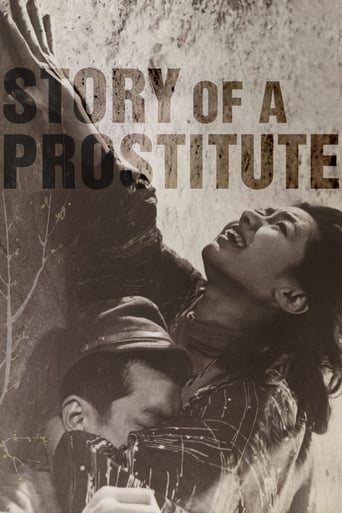MartinHafer
"Sunpu Den" is a film from director Seijun Suzuki is both anti-war and anti-prostitution, as it paints a bleak story of a young woman, Harumi. The story begins with Harumi being dumped by her boyfriend. In reaction, she volunteers to be a 'comfort woman' on the Japanese front lines in China. The comfort women were prostitutes provided by the government for the troops--and this small group of women are to satisfy the sexual needs of a thousand men! To make things worse, the Adjutant in charge is a brutal jerk who mistreats the women. Harumi hates him, though she later falls in love with this man's assistant. What happens next is a tragic waste of life and is an indictment of the Japanese war machine.This is what you might call a 'feel-bad movie'. It is meant to be sad and awful and it is. The film is compelling viewing but isn't nearly as good as other Japanese anti-war films like "Burmese Harp" or "Fires on the Plain". Very good but not great.
kippikari
Seijun Suzuki's portrayal of Taijiro Tamura's, "Shunpu den" articulates Tamura's philosophical notion that "nikutai koto ha subete da" (the body is all there is). Harumi attempts to flee the despair of her situation as a comfort woman in Manchuria by rejecting the ideological and the transcendental; notions that bind her future lover Mikami. Mikami, a solider for the Imperial Japanese army, despite his love of philosophy and ideas (in a time when outside thought was strictly forbidden), is bound by nationalistic virtues of honor and duty; virtues essential to the foundation of the Imperial Japanese ideologies kokutai (national polity) and tennosei (the emperor system).Harumi, who wants to, "throw herself against as many bodies as possible", finds that she can only know others through the physical sensations of the body: physical pleasure, touch, and sex. Although she falls in love with Mikami, she is outraged by his devotion to the Imperial Will, which appears hypocritical. Consequently, this hypocrisy proves fatal for Mikami.In the spirit of Tamura's philosophy, we are left with the notion that there is no honor in dying; that only in the struggles of life can one derive honor, and that nothing is more important than continuing one's existence.
Ehsan Azar
I was surprised to see only few comments for this movie! I found it a quite amusing and worth watching foreign film. There are some beautiful b/w scenes, and the contrast of love and war that remember me of Eisenstein's master pieces. I am fond of the movies which show some psychotic aspect of human being, and this movie looks so real in depicting a prostitute's mentality, one who has lost her lover before and tries to keep some one for her in this lonely world. As the title suggests, the film is really about Harumi (the prostitute) and the war is another story happening at the background, although the movie is considered as anti-militaristic.
zetes
Most likely the closest Suzuki ever got to making a prestige film. It probably wasn't viewed as such at the time, as it was a remake of a movie called Escape at Dawn that was generally considered a classic at the time (it was scripted by Akira Kurosawa and directed by Senkichi Taniguchi in 1950). Story of a Prostitute seemed like a much more lurid version of the older film. Both were anti-war pictures, but Escape at Dawn was romantic and tragic. Story of a Prostitute is harsh and cynical. Its scenes are often comic, which clashes with the standard view of war. In an interview on the new Criterion disc, Suzuki, a veteran himself, says that he found a lot of black humor and absurdity in his wartime experience. All three of WWII-themed films I've seen from him, which cover the pre-war (Fighting Elegy), the actual war (Story of a Prostitute), and post-war (Gate of Flesh) periods all incorporate some level of absurd, black comedy. The three films actually make a good trilogy (the rest I've seen are all yakuza or crime films). Story of a Prostitute is a very powerful anti-war film, though it is lurid and not nearly as powerful as something like, say, Kobayashi's The Human Condition. Yumiko Nogawa, who also starred in Gate of Flesh, gives a fantastic performance. But it is, as usual, Suzuki's supreme visual skills – in black and white in this instance – that make the film a stunning and memorable experience. His artistic imagination in cinematographic matters is nearly unsurpassed in the entire realm of cinema.


